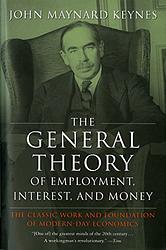The General Theory of Employment, Interest and Money by John Maynard Keynes
This influential economic treatise presents a groundbreaking theory that challenges classical economics, asserting that aggregate demand, driven by public and private sector spending, is the primary factor influencing economic activity and employment levels. The book also introduces the concept of fiscal and monetary policies as tools to manage economic downturns, thus shaping the foundation of modern macroeconomics. It further critiques the idea that market economies would automatically provide full employment and argues for active government intervention to prevent economic recessions and depressions.
The 368th greatest book of all time
Ranking Details:
Our ranking system awards points to books based on their appearance and position on curated lists. Here's how it works:
Unranked Lists: For lists without specific rankings, each book receives points equivalent to the list's weight. This approach recognizes the book's inclusion on prestigious lists.
Ranked Lists: Books on ranked lists receive points in two ways:
- Base Points: Initially, every book is awarded points equal to the list's weight, acknowledging its significance.
- Bonus Points: Additionally, books earn bonus points based on their ranking. The total bonus pool, equal to 100% of the list's weight, is distributed among the books, with higher-ranked books receiving more points.
Exponential Distribution: The distribution of bonus points follows an exponential model. This means the top-ranked book (#1) receives significantly more bonus points than those further down the list (e.g., #100). Our algorithm ensures that higher placements are rewarded more generously, reflecting the achievement of a top rank on any given list.
This scoring system ensures that each book's ranking reflects both its presence on multiple lists and its positions within those lists, providing a comprehensive measure of its acclaim and popularity.
Total Points: 889
Since this book was first published in 1936, there is a penalty of 0%. The age adjusted score is 889.0.
This is to prevent newer books from reaching super high on the ranked list of the greatest books of all time. The greatest books should also stand the test of time.
- score: 141 -- The 100 Best Non-Fiction Books of the Century (Weight: 138)
- score: 120 -- Daily Telegraph's 100 Books of the Century, 1900-1999 (Weight: 120)
- score: 114 -- Books of the Century (Weight: 114)
- score: 112 -- The Modern Library | 100 Best Nonfiction (Weight: 108)
- score: 108 -- The New York Public Library's Books of the Century (Weight: 108)
- score: 96 -- 100 Most Influential Books of the Century (Weight: 96)
- score: 63 -- Books That Changed the World: The 50 Most Influential Books in Human History (Weight: 63)
- score: 45 -- Great Books of the Western World (Weight: 45)
- score: 45 -- The 100 Most Influential Books Ever Written (Weight: 45)
- score: 45 -- The 100 Best Books in the World (Weight: 45)

